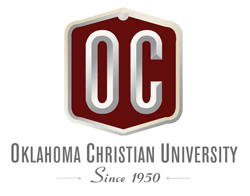Professor of Chemistry Howard Vogel has taught at Oklahoma Christian University for 14 years. Despite his status as a tenured professor, however, the university will not renew his contract to teach next semester.
Due to under-enrollment in the forensic science department and the overarching “financial situation” of the institution, Oklahoma Christian made the executive decision to cut Vogel’s position earlier this month.
University officials cited low enrollment in the degree and a low number of graduates for discontinuing the program. According to university policy, all current forensic students will be offered a “teach-out” of the courses required for the degree.
“The slogan that ‘OC is home,’ I really felt that,” Vogel said. “I felt that this is where I was going to be for the rest of my life. I had no intentions of going anywhere else because I was so happy here. This was where I needed to be.”
The American Association of University Professors states “a tenured appointment is an indefinite appointment that can be terminated only for cause or under extraordinary circumstances such as financial exigency and program discontinuation.” With the purpose of protecting a faculty member’s academic freedom, the association also says tenure is “necessary for all who teach and conduct research in higher education.”
On Feb. 25, the faculty of the College of Natural and Health Sciences learned a tenured chemistry professor would soon lose their job. However, Vogel said, the chemistry faculty was not asked for any input on how to accomplish a reduction or what adjustments would be made.
Late on the evening of March 1, while Oklahoma Christian students prepared for Spring Sing, Vogel became aware his contract would not be renewed, in part “to help the bottom line.”
Dean of the College of Natural and Health Sciences Jeff McCormack and Chief Academic Officer Scott LaMascus referred to the following statement in response to Vogel’s release.
“Like many universities, OC is compelled to make some staffing adjustments in response to current enrollment and revenue declines,” LaMascus said. “Regrettably, these adjustments include some positions. However, it would not be appropriate to discuss any of the specific personnel issues except to say that we will always make these difficult decisions consistent with applicable university policies and with Christian concern and empathy for the individuals directly affected.”
In addition to Vogel’s situation, LaMascus said managing university finances “absolutely” contributes to the creation of an academic guideline which suggests a 15 student class size minimum.
This semester, the Christian Chronicle, a Church of Christ-affiliated publication, reported “Christian universities face ‘extremely difficult’ recruiting outlook” as “the number of high school graduates who identify with Churches of Christ and choose to attend one of 14 universities associated with the fellowship has hit a new low.”
According to data from the 2018 fall demographic handbook, Oklahoma Christian’s enrollment numbers reflect this nationwide trend among Church of Christ-affiliated universities.
Oklahoma Christian had a total headcount of 1,905 undergraduate students enrolled last fall, 223 fewer than the previous year. This enrollment number also marks the lowest number of undergraduate students to attend Oklahoma Christian in the past five years. The number of graduate and international students has also declined since 2014.
The Oklahoma Christian forensics program has long been challenged with stiff competition for students.
According to the University of Central Oklahoma website, the Forensic Science Institute at UCO is one of its most highly recognized and accredited programs. Located just three miles from the Oklahoma Christian campus, it is the home of the largest forensic science education programs in the nation. UCO is also the only university in North America with three accredited forensic science programs.
According to information supplied by the university, forensic science has been an “under-performing degree” in the chemistry discipline since 2010, graduating only seven students since its inception, including only one last spring.
As for Vogel, he currently has no concrete plans for the future. He repeatedly said he “did not know the words” to describe his emotions, constantly wondering what he did wrong. Still, he said he is dealing with the situation as best as he can.
“It makes me feel the opposite of special,” Vogel said. “I don’t know what words I would want to use right now. Eventually, I will be in a place wherever God sends me. That’s where I need to go, but it’s still hurtful. It’s still troubling. It’s the feeling of not being appreciated, of not being at home.”
Editor’s Note: The passage above that read “Late on the evening of March 3, while Oklahoma Christian students performed in Spring Sing, Vogel became aware his contract would not be renewed, in part “to help the bottom line,”’ should now read “Late on the evening of March 1, while Oklahoma Christian students prepared for Spring Sing, Vogel became aware his contract would not be renewed, in part “to help the bottom line.”‘












I am surprised that a department would not be asked to help in this decision-making process. It seems logical to me that the members could help find ways to make this process less painful for everyone. Tenure should offer protection to a professor-not expose him to executive decisions. Also, the area of forensics is cited as one reason for releasing Dr. Vogel from his position. His doctorate is in chemistry. That degree offers him the ability to teach several different scientific disciplines. Praying for Dr. Vogel and his family.